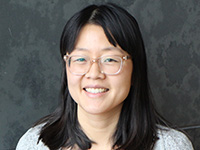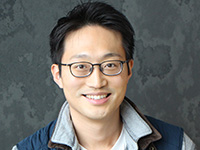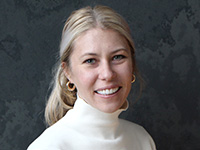This fall, five postdocs from MCB Labs have been awarded prestigious fellowships from notable funding sources, including the NIH, the Harvard Brain Sciences Initiative, the Charles A. King Trust, and the Jane Coffin Childs Memorial Fund. These grants will support postocs Jenny Chen, Souvik Mandal, Tadasu Nozaki, Changwoo Seo, and Rebecka Sepela as they explore research questions in genomics, animal cognition, and more.
Read on to learn more about these postdocs and their research!

Jennifer Chen (Eddy & Hoekstra Labs)
K99/R00 MOSAIC Postdoctoral Transition Award
Jennifer Chen conducts research jointly in the Eddy and Hoekstra Labs. Her current project leverages her background in computational biology to investigate genes that influence behavioral adaptation.
“During graduate school I attended a talk by Hopi and thought the deer mouse system which she developed for studying the genetic basis of innate behaviors was super cool and became really interested in exploring the system for my post-doc,” Chen says. “It’s interesting to me to think about how genes can control animal behavior. We know that genes can’t actually “code” for specific behaviors – instead they are probably coding for specific protein products or other cellular traits such as cell type, population sizes and spatial positioning of specific cell types, etc. which have strong influences on behavior. I’m really curious to understand what those cellular traits are.”
The NIH and the National Institute of General Medical Sciences (NIGMS) have awarded Chen a K99/R00. These Postdoctoral Transition Awards, which are also called “Pathway to Independence Awards,” support up to two years of postdoctoral research and three years of funding once the postdoc establishes their own lab. Chen says she feels “super privileged” to receive this support.
To learn more about Chen and her research, check out her postdoc spotlight here.(LINK)
Her hobbies include traveling and exploring the great outdoors, as well as sampling every boba tea shop in the Boston area.

Souvik Mandal (Murthy Lab)
Harvard Brain Science Initiative Postdoctoral Pioneers Program
Postdoc Souvik Mandal of the Murthy Lab has been interested in the social lives of animals since his childhood on a farm in India. “I have been interested in social animals for as far as my memory goes back,” Mandal says. “I formally studied many social animals, starting from wasps, bees, to crows, to lions, elephants and of course dogs.”
But, at present, is most interested in social cognition and foraging behavior in ants. Despite having relatively small brains, ants exhibit diverse behaviors. “Social insects are of special interest because with a simple brain in their repertoire, they accomplish complex tasks involving both individual as well as collective decision-making; they do so using simple and elegant rules of thumb,” Mandal says. “My research focuses on finding these minimal rules by quantifying animal behavior using cutting-edge technologies like computer vision and artificial intelligence.”
“Currently, I am working on understanding how ants integrate current and prior olfactory information for making decisions individually (while searching for food and following pheromone trails) and collectively (to achieve a common goal),” Mandal says. “While I am developing theoretical frameworks of decision-making from these rules, these rules can further be translated into algorithms that could inspire the development of new solutions for computational problems in the field of artificial intelligence.”
Mandal has been awarded a grant from the Harvard Brain Science Initiative’s Postdoctoral Pioneers Program, which supports mid- or late-stage postdocs who undertake research questions outside of their lab’s core expertise. The grants enable postdocs to take risks, such as studying an organism that is not part of their lab’s typical repertoire.
Mandal is enthusiastic about his ant research and says he feels “good” about receiving a grant in support of it. “I would like to thank everybody who shared a smile with me, listened to my concerns, and provided me with their valuable advice,” he says.
Prior to becoming a postdoc, Mandal worked as a professional filmmaker, painter, and photographer. He says that if he were not in science, he would probably be focused on filmmaking. His favorite way of getting to know people is through shared experiences, rather than simply stating assorted facts.

Tadasu Nozaki (Kleckner Lab)
Charles A. King Trust Postdoctoral Research Fellowship
Tadasu Nozaki has joined the Kleckner Lab as a research associate. His research will investigate how chromosomes find their matching homologs during meiosis in budding yeast.
These research questions arose from Nozaki’s curiosity about how cells store and retrieve genomic information, as well as his interest in the mechanical behavior of chromosomes. “Meiotic homolog pairing is one of the very good questions including both of these aspects,” Nozaki explains. “Chromosomes need to search for their homolog partner and chromosomes need to get close together in space. I think understanding the homolog pairing will connect to understand many relevant questions about chromosomes.”
Nozaki’s research is funded by a grant from the Charles A. King Trust Postdoctoral Research Fellowship Program, which provides two years of funding to scientists at Massachusetts-based institutions. “I’m very proud of getting this fellowship,” Nozaki says. “This fellowship is one such fellowship that postdocs who finished 3-5 years of training can apply.”
Nozaki is excited to join the Harvard community. While he’s here, he hopes to meet his research idol, MCB professor Matthew Meselson. Nozaki is also looking forward to interactions with his labmates.“I’m very happy to be working in Nancy’s lab,” Nozaki says. “I can learn a lot of things and get many ideas from Nancy and the lab members.”
When he’s not cultivating budding yeasts in the lab, Nozaki can be found bouldering with his family, practicing the Japanese martial art kendo, or recording episodes of a Japanese-language podcast about science called Researchatfm.

Changwoo Seo (Dulac Lab)
Kavli Innovation Grant & Jane Coffin Childs Fund Fellowship
Postdoc Changwoo Seo of the Dulac Lab has teamed with Dr. Weijian Zong of Moser Lab at the Norwegian University of Science and Technology to pursue research under the auspices of a Kavli Innovation Grant. Zong has developed a miniaturized version of a two-photon microscope, called MINI2P, that can record multi-photon images in freely-moving animals, and Seo is applying the MINI2P technology to fundamental neuroscience questions about social behaviors in mice.
“We aim to combine two techniques – MINI2P and imaging-based single-cell transcriptomics to understand how gene expression governs neural clusters and how they contribute to neural circuits that control social behavior in mice,” he explains.
Seo’s research is also supported by a Jane Coffin Childs Fund Fellowship, which awards funding to promising postdoctoral researchers whose work has the potential to address human disease.
Seo is excited about the MINI2P project and being one of the first scientists to use the new technology. “With the support of the two labs (Dulac and the Moser Labs), I had an opportunity to visit Norway to learn about the MINI2P,” Seo says. “I had a great time meeting the Moser Lab and learning about science and technology. I also got to enjoy the beautiful Norwegian nature. I hope to visit Norway again.”

Rebecka Sepela (Bellono Lab)
Ruth L. Kirschstein National Research Service Award (NRSA) Individual Postdoctoral Fellowship
As a graduate student, Rebecka Sepela studied ion channels in traditional model organisms, but, when she met Woods Hole biologist Joshua Rosenthal, who studies RNA editing in cephalopods, she decided to try using octopuses as a research animal. That decision led her to the Bellono Lab, where her postdoctoral research will delve into the proteins that form ion channels in octopus cells and whether structural changes to those proteins correlate with adaptation at the organismal level.
Octopuses and their cephalopod relatives use “RNA editing”–a process where enzymes modify the bases in a protein-coding RNA after transcription–far more frequently and more widely than other animals. Sepela aims to find out whether RNA editing in ion channel proteins corresponds to behavior or other adaptations.
“I will characterize the transcriptomic and proteomic variety of octopus chemoreceptors from animals under different conditions and then assess channel function,” she says. “The octopus provides us with a unique opportunity to execute natural structure-function experiments that will inform how chemosensory ion channels function, the modes through which function can be tuned, and whether tuning at a single protein level is correlated with adaptive behaviors.”
This fall, Sepela received an F32 from the NIH/NIGMS in support of her octopus ion channel research. She is excited about receiving the award and continuing her research. “I am grateful for the support of my letter writers and mentors at Harvard and Dana Farber Cancer Institute, for their enthusiasm for the project, and for their willingness to collaborate,” she says.
“My experience at Harvard has surpassed expectations,” Sepela adds. “When entering a new field, formulating a research question, finding new collaborators, and navigating institutional policies can be difficult. I have received substantial amounts of support from the Harvard community in all these aspects. The zeal for research and collaborative spirit of Harvard and the MCB department makes for a wonderful place to do science.
Outside of the lab, Sepela’s hobbies include riding, building, and racing road and gravel bikes, as well as chowing down on pickled foods.
Congratulations to Dr. Chen, Dr. Mandal, Dr. Nozaki, Dr. Seo, and Dr. Sepela!


